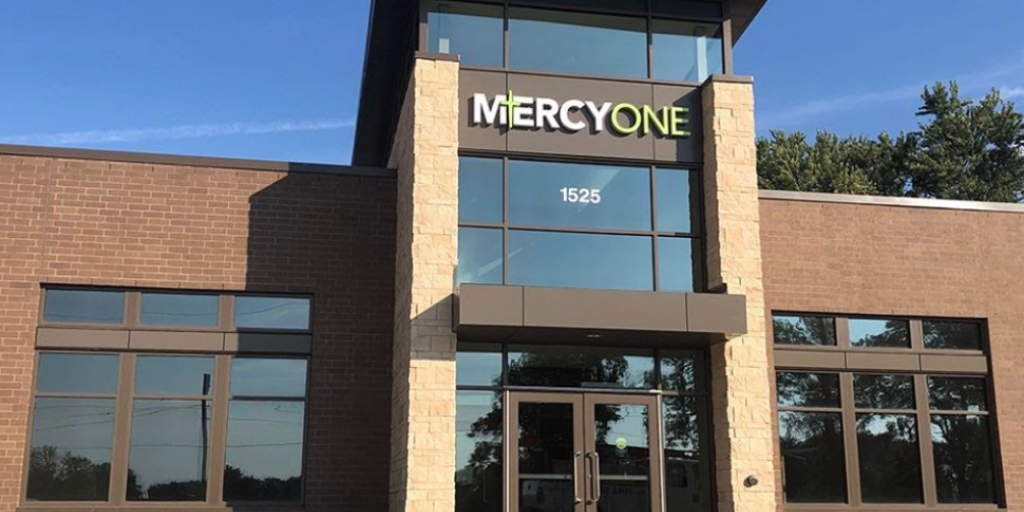
As one of 100 great hospitals in the U.S. according to Becker’s Healthcare, MercyOne Des Moines Medical Center is among the nation’s high-performing hospitals, recognized for excellence in clinical care, patient outcomes and staff and physician satisfaction. One of central Iowa’s largest multi-specialty clinic systems, MercyOne is made up of more than 50 primary care, pediatric, internal medicine and specialty clinics with more than 7,000 colleagues and a medical staff of more than 1,000 physicians and allied health professionals.
Continuing to strive for excellence in clinical care and patient outcomes, the team at MercyOne Des Moines is committed to improving lung cancer detection and treatment in their community.
“The MercyOne Lung Cancer Screening, Pulmonary Nodule, and Lung Cancer Program was developed to ensure the efficient, compassionate, state-of-the-art evaluation and management of patients with newly diagnosed pulmonary nodules, lung masses, and lung cancers,”
Neil Horning, MD, FACP, FCCP - Medical Director MercyOne Des Moines Lung Cancer Screening Program
MercyOne Des Moines chose to partner with Thynk Health, utilizing their complete lung cancer screening & incidental finding management solution to build an efficient and effective screening solution that would increase lung cancer screenings among at-risk patients, automate data entry and patient tracking, while freeing up staff and physician resources to focus on patient care. In just one year of implementation, MercyOne is already seeing significant results.
AT-RISK PATIENT IDENTIFICATION & INCREASE IN SCREENING
Thynk Health securely integrates with MercyOne’s existing hospital systems and identifies at-risk patients using natural language processing to extract critical information from unstructured data. Analyzing medical history and demographics, Thynk Health’s LDCT Module flags patients at a higher risk of lung cancer and reports findings to care teams.
At MercyOne Des Moines, enhanced patient identification and automation has translated into tremendous growth in the MercyOne Lung Cancer Screening, Incidental Pulmonary Nodule, and Lung Cancer Program with a 76.2% increase in the number of new patients undergoing screening from 2018 to 2019.
Thynk Health automates the tracking of incidental findings, missed appointments, overdue annual screenings, and overdue follow-up diagnostic procedures to ensure patients do not fall through the cracks at MercyOne Des Moines. This has resulted in an increase in follow-up screening CTs by 18.8 percent from 707 in 2018 to 840 screenings in 2019.
In all, the number of patients undergoing lung cancer screening increased to 1,462 in 2019, a 38% increase from the 1,060 patients screened in 2018, and a 162.5% increase compared with 2017, in which 556 patients were screened.
EARLY IDENTIFICATION & PATIENT OUTCOMES
Lung Cancer continues to be the deadliest cancer in the world, with more deaths than the next three cancers (breast, pancreas, colon, and rectum) combined. The five-year survival rate is a mere 18% because lung cancer frequently goes undetected until stage 3 or 4. However, if lung cancer is caught before it spreads, the likelihood of surviving 5 years or more improves to 55% according to the Lung Cancer Foundation of America. Early detection through low-dose CT screening can decrease lung cancer mortality rates by 14%-20% among high-risk populations. This is why improving the identification and screening of at-risk patients is a critical component of Thynk Health’s solution.
At MercyOne Des Moines, the increase in patient screenings led to a 86.7 percent increase in cancer detection, with 28 cases of lung cancer detected in 2019 compared to 15 cases in 2018.
Most importantly, of the 28 lung cancers diagnosed in 2019, 50 percent were detected in the early stage, and thus potentially curable lung cancers.
| Stage 1A | Stage 1B | Stage 2B | |
|---|---|---|---|
| Cancers Detected | 10 | 3 | 1 |

COMMUNITY & PROVIDER OUTREACH
The MercyOne Lung Cancer Clinic opened in June of 2018. In the first 18 months, the Clinic served 107 patients diagnosed with lung cancer.
| Stage 1 | Stage 2 | Stage 3 | Stage 4 |
|---|---|---|---|
| 41% | 13% | 24% | 22% |
Outreach to doctors, APCs, nurses, primary care clinics and to the community has continued to be a major focus of the work at MercyOne. The invested Lung Cancer Screening Program team visited 21 primary care clinics, reviewing how to refer patients to the Lung Cancer Screening, Incidental Pulmonary Nodule, and Lung Cancer Program. Thynk Health’s lung module shares important information with primary care physicians, like the number of their patients currently eligible for lung cancer screening and the number of screening ordered. Customized communications are available to the provider’s patients with informing patients of eligibility and scheduling prompts.
LOOKING FORWARD
MercyOne Des Moines plans to continue making huge strides in their lung cancer screening program and continue to increase lung cancer screenings, as well as increase the numbers of incidental pulmonary nodules that are found and referred to the Pulmonary program.
MercyOne Des Moines will utilize Thynk Health’s Nodule Nav to process radiology reports, extract the number of nodules, nodule size, location, and nodule characteristics. This will enable them to automatically track nodule changes within each appointment, flag nodules for follow-up, and recommend next steps.
2019 was the most successful year the MercyOne Lung Cancer Screening, Pulmonary Nodule Program, and Lung Cancer Clinic has had. Everyone involved in the Program believes that in 2020 we will be able to care for even more patients with lung cancers and pulmonary nodules with our unique, efficient, compassionate, state-of-the-art program that places patients and their families at the center of everything we do.
Neil Horning, MD, FACP, FCCP - Medical Director MercyOne Des Moines Lung Cancer Screening Program
